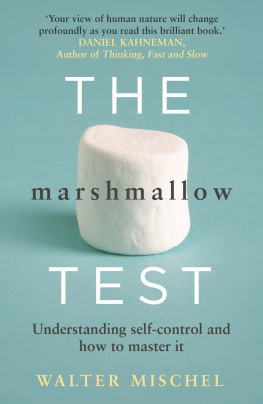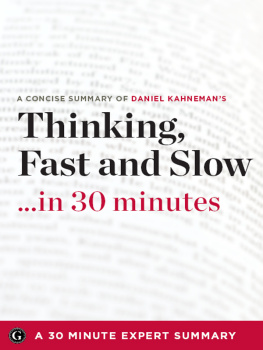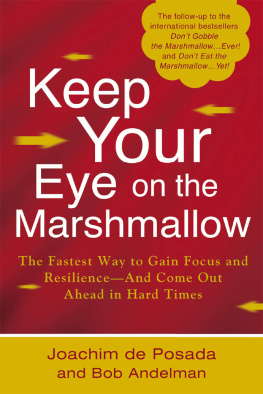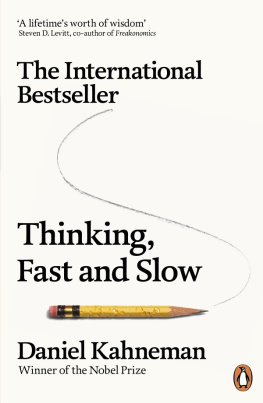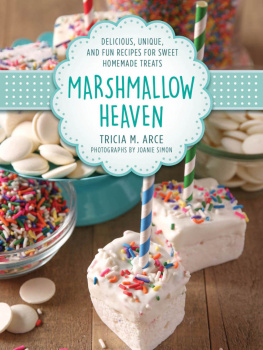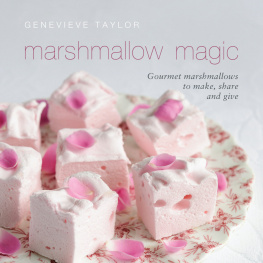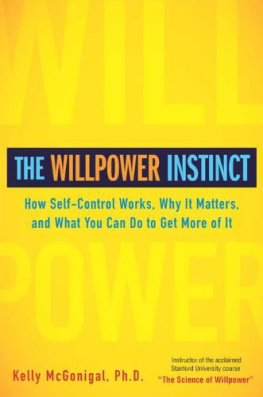ABOUT THE BOOK
Renowned psychologist Walter Mischel, inventor of the famous Marshmallow Test, explains what self-control is and how to master it.
A child is presented with a marshmallow and given a choice: Eat this one now, or wait and enjoy two later. What will she do? And what are the implications for her behaviour later in life?
Walter Mischels now iconic Marshmallow Test, one of the most famous experiments in the history of psychology, proved that the ability to delay gratification is critical to living a successful and fulfilling life: self-control not only predicts higher marks in school, better social and cognitive functioning, and a greater sense of self-worth; it also helps us manage stress, pursue goals more effectively, and cope with painful emotions. But is willpower prewired, or can it be taught?
In his groundbreaking new book, Dr. Mischel draws on decades of compelling research and life examples to explore the nature of willpower, identifying the cognitive skills and mental mechanisms that enable it and showing how these can be applied to challenges in everyday life from weight control to quitting smoking, overcoming heartbreak, making major decisions and planning for retirement. At the heart of the story are two closely interacting systems within the human brain, one hot and reflexive, the other cool and strategic. The ways in which these two systems interact in the face of strong temptations underlie how preschoolers deal with marshmallows and how our own willpower works, or doesnt.
With profound implications for the choices we make in parenting, education, public policy and self-care, The Marshmallow Test will change the way we think about who we are and what we can be. And since, as Mischel argues, a life with too much self-control can be as unfulfilling as one with too little, this book will also teach you when its time to ring the bell and enjoy that marshmallow.
CONTENTS
PART I
DELAY ABILITY: ENABLING SELF-CONTROL
PART II
FROM MARSHMALLOWS IN PRESCHOOL TO MONEY IN RETIREMENT
PART III
FROM LAB TO LIFE

TRANSWORLD PUBLISHERS
6163 Uxbridge Road, London W5 5SA
www.penguin.co.uk
Transworld is part of the Penguin Random House group of companies whose addresses can be found at global.penguinrandomhouse.com
First published in Great Britain in 2014 by Bantam Press
an imprint of Transworld Publishers
Copyright Walter Mischel 2014
Walter Mischel has asserted his right under the Copyright, Designs and Patents Act 1988 to be identified as the author of this work.
The publisher is not responsible for websites (or their content) that are not owned by the publisher.
The illustration , If-Then Profiles for Jimmy and Anthony, was created from data in Y. Shoda, W. Mischel, and J. C. Wright, Intraindividual Stability in the Organization and Patterning of Behavior: Incorporating Psychological Situations into the Idiographic Analysis of Personality, Journal of Personality and Social Psychology 67, no. 4 (1994): 674687.
Excerpts from David G. Myers, Self-Serving Bias, in This Will Make You Smarter: New Scientific Concepts to Improve Your Thinking edited by John Brockman (New York: Doubleday, 2012), 3738. Used with permission. Quotes from George Ramirez are printed with permission. Excerpts from Sesame Street script for episode 4412 are reprinted with permission. Sesame Workshop, Sesame Street, and associated characters, trademarks, and design elements are owned and licensed by Sesame Workshop. 2014 Sesame Workshop. All Rights Reserved.
A CIP catalogue record for this book is available from the British Library.
Version 1.0 Epub ISBN 9781448154227
ISBNs 9780593071311 (cased)
9780593071328 (tpb)
This ebook is copyright material and must not be copied, reproduced, transferred, distributed, leased, licensed or publicly performed or used in any way except as specifically permitted in writing by the publishers, as allowed under the terms and conditions under which it was purchased or as strictly permitted by applicable copyright law. Any unauthorized distribution or use of this text may be a direct infringement of the authors and publishers rights and those responsible may be liable in law accordingly.
1 3 5 7 9 10 8 6 4 2
For Judy, Rebecca, Linda
INTRODUCTION
A S BOTH MY STUDENTS and my children can testify, self-control does not come naturally to me. I have been known to call my students in the middle of the night to ask how the latest data analysis was going, though it began only that evening. At dinners with friends, to my embarrassment my plate is often the first to be clean, when others are far from done. My own impatience, and the discovery that self-control strategies can be learned, has kept me studying those strategies for a lifetime.
The basic idea that drove my work and motivated me to write this book was my belief, and the findings, that the ability to delay immediate gratification for the sake of future consequences is an acquirable cognitive skill. In studies initiated half a century ago, and still ongoing today, weve shown that this skill set is visible and measurable early in life and has profound long-term consequences for peoples welfare and mental and physical health over the life span. Most important, and exciting for its educational and child-rearing implications, it is a skill open to modification, and it can be enhanced through specific cognitive strategies that have now been identified.
The Marshmallow Test and the experiments that have followed over the last fifty years have helped stimulate a remarkable wave of research on self-control, with a fivefold increase in the number of scientific publications just within the first decade of this century. In this book I tell the story of this research, how it is illuminating the mechanisms that enable self-control, and how these mechanisms can be harnessed constructively in everyday life.
It began in the 1960s with preschoolers at Stanford Universitys Bing Nursery School, in a simple study that challenged them with a tough dilemma. My students and I gave the children a choice between one reward (for example, a marshmallow) that they could have immediately, and a larger reward (two marshmallows) for which they would have to wait, alone, for up to 20 minutes. We let the children select the rewards they wanted most from an assortment that included marshmallows, cookies, little pretzels, mints, and so on. Amy, for example, chose marshmallows. She sat alone at a table facing the one marshmallow that she could have immediately, as well as the two marshmallows that she could have if she waited. Next to the treats was a desk bell she could ring at any time to call back the researcher and eat the one marshmallow. Or she could wait for the researcher to return, and if Amy hadnt left her chair or started to eat the marshmallow, she could have both. The struggles we observed as these children tried to restrain themselves from ringing the bell could bring tears to your eyes, have you applauding their creativeness and cheering them on, and give you fresh hope for the potential of even young children to resist temptation and persevere for their delayed rewards.
What the preschoolers did as they tried to keep waiting, and how they did or didnt manage to delay gratification, unexpectedly turned out to predict much about their future lives. The more seconds they waited at age four or five, the higher their college-admission SAT scores and the better their rated social and cognitive functioning in adolescence. At age 2732, those who had waited longer during the Marshmallow Test in preschool had a lower body mass index and a better sense of self-worth, pursued their goals more effectively, and coped more adaptively with frustration and stress. At midlife, those who could consistently wait (high delay), versus those who couldnt (low delay), were characterized by distinctively different brain scans in areas linked to addictions and obesity.

